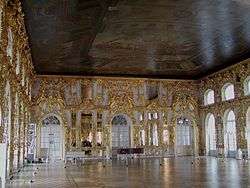Ballroom

| Wikimedia Commons has media related to Ballrooms. |
A ballroom is a large room inside a building, the designated purpose of which is holding large formal parties called balls. Traditionally, most balls were held in private residences; many mansions contain one or more ballrooms. In other large houses, a large room such as the main drawing room, long gallery, or hall may double as a ballroom, but a good ballroom should have the right type of flooring, such as hardwood flooring or stone flooring (usually marble).
Ballrooms are generally quite large, and may have ceilings higher than other rooms in the same building. The large amount of space for dancing, as well as the highly formal tone of events have given rise to ballroom dancing. The largest balls are now nearly always held in public buildings, and many hotels have a ballroom. They are also designed large to help the sound of orchestras carry well throughout the whole room.
A special case is the annual Vienna Opera Ball, where, just for one night, the auditorium of the Vienna State Opera is turned into a large ballroom. On the eve of the event, the rows of seats are removed from the stalls, and a new floor, level with the stage, is built.
Sometimes ballrooms have stages in the front of the room where the host or a special guest can speak. That stage can also be used for instrumentalists and musical performers.
List of hardwood floor ballrooms
These lists should only include ballrooms with permanent wood floors. The size of the floor should only include the largest contiguous area without obstructions. The web sites and materials about some places add up multiple spaces, rooms, and balconies, and floors. However, this list ranks ballrooms based on the size of one single open space with a hardwood floor.
See also
- Texas Dance Hall Preservation Inc.
- List of ballrooms at the National Ballroom & Entertainment Association
- Iowa Ballroom Project
- Robert Meyer,"Millennium Maple - Glorious, Historic, Legendary, Treasured Ballroom Dance Floors", Amateur Dancers, Jan/Feb 2000, Issue#123.
- Geronimo Trevino. Dance Halls and Last Calls: A History of Texas Country Music. Lanham, MD: Republic of Texas Press 2002. ISBN 1-55622-927-5. Copyright
References
- ↑ This rough estimate is based upon photos and not from measurements. Two unofficial pages say that the ballroom is 45,000 square feet, and that the building itself is 300 ft x 150 ft. From pictures, the dancable area without columns is currently smaller than the building although very large. It was billed as the "Largest Dancing Pavilion on the Great Lakes," in David Nasaw, Going out: the rise and fall of public amusements,(Cambridge, MA: Harvard University Press, 1999), p. 90.
- ↑
- ↑
- ↑ 70x 125
- ↑
- ↑ The building is 70' x 122' but the dance floor sits in from the walls approximately four feet and is raised up a few inches. 62' X 116' = 7192
- ↑ http://www.austin360.com/news/content/recreation/guides/visit/dancehall.html
- ↑ Lisa Light, Destination Bride, (Georgetown, ON: North Light Books, 2005), p. 170.
- ↑ estimate based on architectural drawing
- ↑ Savage, Rebecca Binno; Greg Kowalski (2004). Art Deco in Detroit. Arcadia Publishing. pp. 98–104 Although this page says just 5,000
- ↑ Not open to the public
- ↑ 81' x 63' http://www.iowaballroom.com/p/act/ep_wloo.html
- ↑ The floor is definitely larger, but the size is irregular. This estimate is based on this floor plan
- ↑
- ↑ capacity of 6,000 people Ralph G. Giordano, Country & Western Dance, Santa Barbara, CA: ABC-CLIO, 2010 p.42-3.
See also
- Aragon Ballroom (Ocean Park, Santa Monica, California)
- Ballroom an album of Irish music by De Dannan